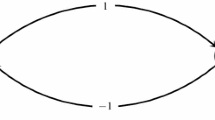Summary
We study a strategic version of the neoclassical growth model under possible production uncertainty. For a general specification of the problem, we establish (i) the existence of stationary Markov equilibria in pure strategies for the discounted game, and (ii) the convergence, under a boundedness condition, of discounted equilibrium strategies to a pure strategy stationary Markovian equilibrium of the undiscounted game as the discount factor tends to unity. The same techniques can be used to prove that such convergence also obtains in all finitestate, finite-action stochastic games satisfying a certain “full communicability” condition. These results are of special interest since there are well known examples in the literature in which the limit of discounted equilibria fails to be an equilibrium of the undiscounted game.
Similar content being viewed by others
References
Aumann, R.: Game theory. In: Eatwell, J., Millgate M., Newman P. (eds.) The new Palgrave. London: 1987
Benhabib, J., Radner, R.: The joint exploitation of a productive asset: a game-theoretic approach. Econ. Theory2, 155–190 (1992)
Billingsley, P.: Probability and measure, 2nd edn. New York: Wiley 1985
Blackwell, D.: Memoryless strategies in finite-stage dynamic programming. Ann. Math. Stat.35, 863–865 (1964)
Blackwell, D.: Discounted dynamic programming. Ann. Math. Stat.36, 226–235 (1965)
Cave, J.: The cold fish war: long-term competition in a dynamic game. Rand J. Econ.18, 596–619 (1987)
Clemhout, S., Wan, H.Y.: Cartelization conserves endangered species? An application of phase diagram to differential games. In: Feshtinger, G. (ed.) Economic applications of control theory II. Amsterdam: North Holland, 1985
Debreu, G.: A social equilibrium existence theorem. Proc. Natl. Acad. Sci. USA38, 931–938 (1954)
Duffie, D., Geanakapolos, J., Mas-Colell, A., McLennan, A.: Stationary Markov equilibria. Mimeo, University of Minnesota, 1988
Dutta, P.K.: What do discounted optima converge to? A theory of discount rate asymptotics in economic models. J. Econ. Theory55, 64–94 (1991)
Dutta, P., Sundaram, R.: The tragedy of the commons? A complete characterization of stationary equilibria of dynamic resource games. Mimeo, University of Rochester, 1989
Dutta, P., Sundaram, R.: Stochastic games of resource allocation: existence theorems for discounted and undiscounted models. RCER Working Paper 241, University of Rochester, 1990
Easwaran, M., Lewis, T.: Appropriatability of a common-property resource. Economica51, 343–400 (1985)
Lancaster, K.: The dynamic inefficiency of capitalism, J. Polit. Econ.81, 1098–1109 (1973)
Levhari, D., Mirman, L.: The great fish war: an example using a dynamic Cournot-Nash solution. Bell J. Econ.11, 322–334 (1980)
Majumdar, M.K., Sundaram, R.K.: Symmetric stochastic games of resource extraction: The existence of non-randomized stationary equilibrium. In: Ferguson, T., Parthasarathy, T., Raghavan I.E.S., Vrieze, O. (eds.) Stochastic games and related topics. The Netherlands: Kluwer Academic Publishing, 1988
Mertens, J.-F., Parthasarathy, T.: Stochastic games CORE Working Paper, Catholic University, Belgium, 1987
Mirman, L.: Dynamic models of fishing. In: Liu, P.T., Sutinen, J.G. (eds.) Control theory in mathematical economics. New York: Decker, 1979
Nowak, A.: Existence of equilibrium stationary strategies in discounted non-cooperative stochastic games with uncountable state space. J. Optimization Theory Appl.45, 591–602 (1985)
Parthasarathy, K.R.: Probability measures on metric spaces. New York London: Academic Press, 1967
Parthasarathy, T.: Discounted, positive, and noncooperative stochastic games. Int. J. Game Theory2, 25–37 (1973)
Reinganum, J., Stokey, N.: Oligopoly extraction of a common-property resource: importance of the period of commitment in dynamic games. Int. Econ. Rev.26, 161–174 (1985)
Smart, D.: Fixed-point theorems. London New York: Cambridge University Press 1974
Sorin, S.: An asymptotic property of non-zero sum stochastic games. Int. J. Game Theory15 (1986)
Stokey, N., Lucas, R., Prescott, E.: Recursive methods in economic dynamics. Cambridge, Mass: Harvard University Press, 1989
Sundaram, R.K.: Perfect equilibrium in a class of symmetric dynamic games. J. Econ. Theory47, 153–177 (1989)
Author information
Authors and Affiliations
Additional information
We are grateful to Marcus Berliant, M. Ali Khan, Mukul Majumdar, and an anonymous referee for helpful suggestions, and to Bonnie Huck for technical assistance. The first author acknowledges research support from the Columbia University Council for the Social Sciences.
Rights and permissions
About this article
Cite this article
Dutta, P.K., Sundaram, R. Markovian equilibrium in a class of stochastic games: existence theorems for discounted and undiscounted models. Econ Theory 2, 197–214 (1992). https://doi.org/10.1007/BF01211440
Received:
Revised:
Issue Date:
DOI: https://doi.org/10.1007/BF01211440



